Ultimate Guitar recently conducted an interview with punk legend Ian MacKaye (formerly of MINOR THREAT and FUGAZI and currently of THE EVENS), who talks about his inspiration in becoming a musician.
When, why, and how did you first pick up guitar?
The first time I ever played guitar was probably when I was 10, or 11 maybe? I had played piano since I was a little kid, I started playing piano before I can remember; I actually wrote my first sort of rudimentary songs when I was three or four years old, somewhere around there. And then, took some piano lessons with a local woman up the street who just taught me, basically, how to read, kind of – it was very lighthearted kind of stuff. Then my mom put me in a more involved school and I hated it and I quit. I quit playing piano, even.
At some point, I thought I was gonna try to learn guitar because I was very much into Jimi Hendrix and loved rock & roll and I wanted to play guitars and I wanted to break guitars. I had seen the Who at Monterey Pop and Hendrix at Monterey Pop, and it just seemed like ‘Wow, I wanna do that.’ There was a guy in my neighborhood, kind of a local tough guy, named Nicky, and he was a tough guy, and my Mom in a sort-of moment of great wisdom hired him – he played guitar so she hired him to teach me how to play guitar. But really, in a way, it was also de-fanging him, because he’s not going to beat up a student. He was four or five years older than me.
So I had gotten a guitar, I think we had bought a guitar from a garage sale for like $20. My Mother had never played guitar, none of us had any idea, so the guitar, the action was probably an inch and a half off the fret board and it was basically unplayable, but nobody knew that. And Nicky taught me how to play Smoke on the Water, but just on one string, basically. Having played piano, I could not understand the way the guitar worked. It’s a totally different instrument, and my whole understanding of music had been sort of framed around the piano keyboard. And I just didn’t understand the relationship between the way the strings worked and the notes, I just couldn’t understand how the chords would work, and I just kind of gave up on that idea, I really gave up on guitar period at that point and thought I would just not play music.
Then in high school, there were some friends who had rock bands and one band was looking for a keyboardist, so I thought I would try out. They wanted to play rock. A band called Frozen Heat, they were a cover band; and I had one practice with them, which was probably – I have no idea what they thought, but I thought it was horrible. I remember doing the Beatles’ birthday song, in which I would just play the end of the riff, the “hey-its-your-birthday” part. Sunshine of your love, Cream, I would just play the last two chords, the “dun dun, dun” part of the riff. I mean, I didn’t know! Anyways, I didn’t get the gig.
In 1979, or late 78, punk kinda showed up. It really showed up at my high school, and there were these people I was friends with who were really into it; at the time, I was a real Double Live Gonzo!, Ted Nugent fan. I saw Nugent three times. Pretty epic, I have to say.
I never would have guessed that.
You gotta remember, I was a skateboarder, and at that time, the 70s, to all the skateboarders, Nugent was a godhead. And Henry – y’know, Henry Rollins, at that time named Henry Garfield – he and I grew up together, and we went to see Nugent together three times. I mean, Nugent, those shows were incredible. I have to say, as deranged as he seems now and as totally unlike me, how we totally couldn’t be more different people now… at the time, at those shows, I just saw thought those shows were incredible. He cussed on stage, he spit on stage, I thought he was a great guitar player and his shows were so visceral and terrifying.
It was kinda normal at those shows, big arena shows, fifteen or sixteen thousand people, people would regularly throw firecrackers on stage. People were setting off fireworks in the building all the time. And someone threw a firecracker and it blew up right next to his fingers while he was playing, and he went ballistic and was threatening everyone in the audience, trying to get people to identify the dude so he could come suck his eyeballs out. For a fifteen or fourteen year old, it was alive! I was very, very blown away.
So Nugent was a big deal, and the first band I ever saw was Queen, Thin Lizzy and Queen in 1975. That was pretty incredible, too. So, I had long since given to the idea of playing guitar, but you think about Brian May, Ted Nugent, Jimmy Page, Jimi Hendrix – the way they played guitar, all these guys in their own way have their own style and its pretty celestial, and it was just out of reach for somebody who couldn’t even make a chord work.
Punk rock really got it rolling for you.
The thing about punk rock was, at first I had to get my mind around what it was, because I couldn’t understand the music at first. I’ve used this analogy many times before but I think it’s a really apt one, which is: if you’re raised eating steak and potatoes every night and that’s dinner, when you go to a Vietnamese restaurant, you don’t know what’s in front of you. You just can’t recognize it. The thing is that not only is it good, it’s probably better for you. And that took me some time to figure out how punk was music.
I couldn’t hear it because I was so used to how mainstream rock and roll sounded, so hearing bands like the Cramps or the Clash, or the Sex Pistols – the Sex Pistols were an incredible gateway punk band, because they had enough rock to them, that you could’ve kind of make the connection, so you could make the leap, and yet they were terrifying. I think the song Bodies is still such an incredible song, and the lyrics are so heavy, so unlike anything I’d ever heard from anywhere; bands just didn’t sing about that kind of stuff.
So I was very excited, because it was like a whole new world and it sort of represented counter-culture, this underground I was searching for. I grew up in the 60s like “Yeah, I’m part of the new world,” and the new world sort of just packed it in during the 70s. It was this very weird time with disco music.
Prog rock, disco, and funk took over.
Yeah, and it was just really brutal. It was so boring, and all the kids in high school, no one really had anything to rebel against except – they couldn’t see it. The only way people rebelled was by self-destructing, which I wasn’t interested in. And punk rock was this incredibly creative, wild, open spot and that’s really where I wanted to be. So, I started going to shows around January of 1979, and shortly after there we decided we were gonna form a band in my high school. My friends, Geordie Grindle had played guitar in another band and Mark Sullivan had sung in another band, Jeff Nelson had played the timpani in the school orchestra so he was the drummer so I said “OK, I’ll be the bass player.” So I played bass, and because I had already taken lessons with Nicky and learned Smoke on the Water on one string, no problem! I was already there. So I taught myself how to play the bass, and I played bass in the first band, the Slinkees and then the Teen Idles, and at some point towards the end of that band, I borrowed an acoustic guitar and started to understand how notes related on the fret board. I started to understand how you made chords, started out with two finger chords and made my way up. I still basically don’t play full chords; I just have my own weird way of playing. I didn’t start playing guitar really proper – I didn’t play guitar in a band until Fugazi which was 1986, but before that I had done some recording playing guitar, I wrote songs on guitar, a lot of the Minor threat songs I had wrote on an acoustic guitar.
I bought this acoustic guitar from Brian Baker, the bass player from Minor threat, for like $25; I still have it, I still play it. It’s a junky old acoustic. At some point, I think in 1985 or 1986, I bought an SG from my boss at the record store, this guy Skip Groff who owned this store called Yesterday and Today, I bought the guitar for $200; he had never used it and I wanted to play guitar. I just started figuring it out.
I was in other bands, and there were some bands, one band called Embrace that was ill-fated, the desire to be in a band outweighed the actual personalities in the band. So once we got in a band, we immediately broke up. We should’ve broken up the week after we started playing, but instead we were just miserable for nine months. After that, I thought, “You know, being in a band is the problem. I want to play music.” And that’s when I really started to address the guitar and I started playing with people, clearly not to be in a band but just to play music. That’s when I started playing with Joe Lally and a number of drummers but Brendan Canty was one of those drummers, and that’s how we got to Fugazi. We spent a year of playing music together playing with people in the basement and I just played guitar. So there’s your very long answer to a very short question.
The rest of the interview can be read here.
Photo by “Shanty” Cheryl.



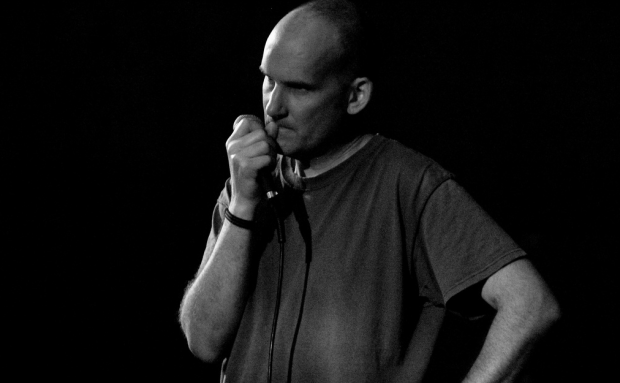
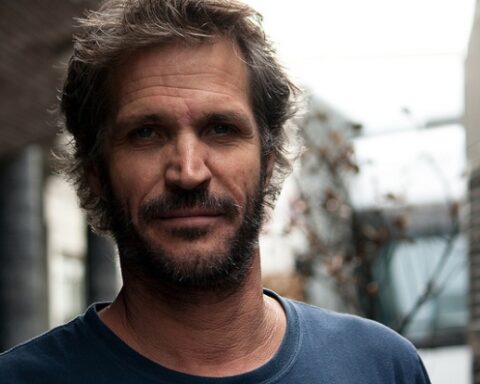
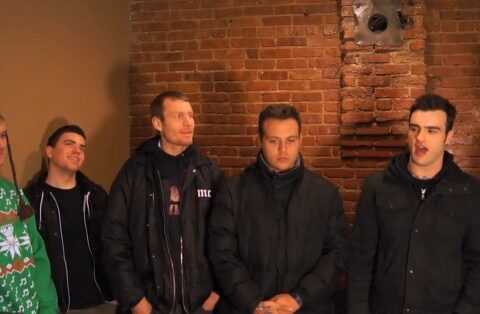
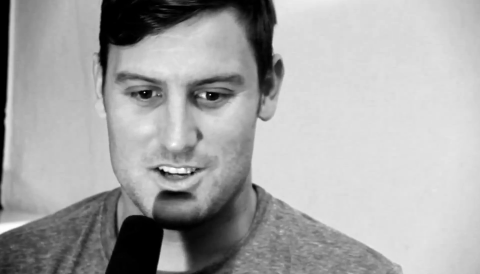
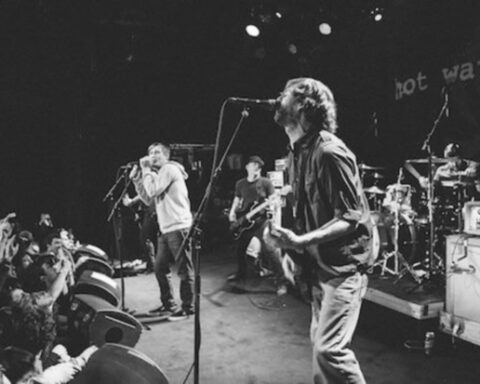
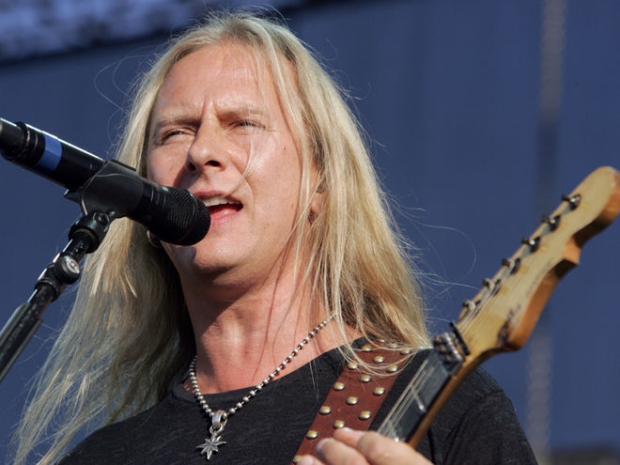
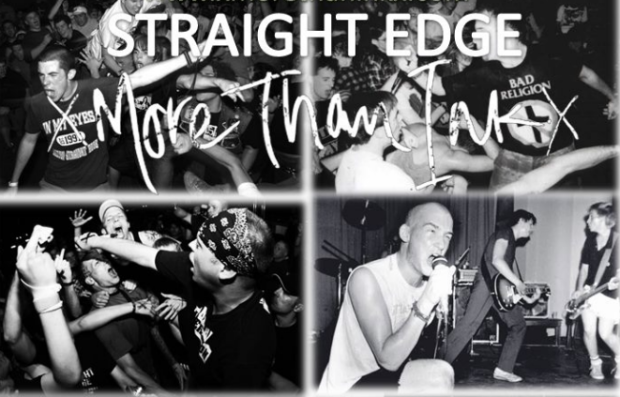





[…] from: Idioteq… This entry was posted in acoustic, acoustic guitar, and, band, guitar, how, How To Play, How to […]
Ultimate guitars is my fav topic. Thanks for sharing information on that issue. Thanks, Alwinlin :)